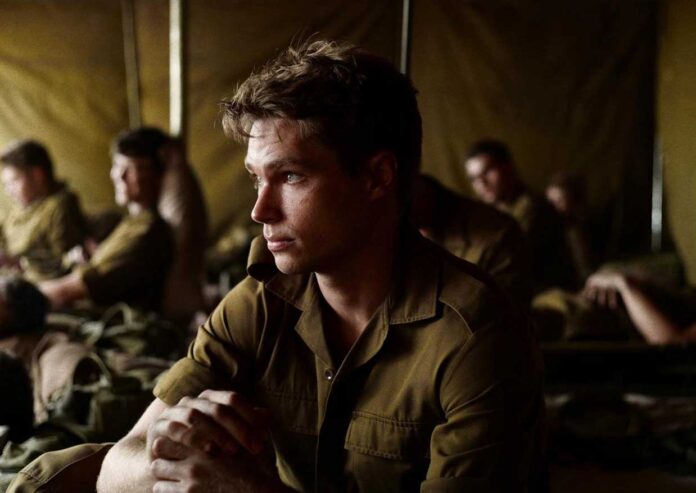“Moffie” — a word equivalent to “faggot” in Afrikaans — is an intimate, heartbreaking film about Nicolas (Kai Luke Brummer), a handsome, closeted queer teen conscripted to military service in 1981 South Africa. The Angola War is on and the white minority are enlisted to fight against Communism as well as the “black danger” (a term that is as racist as it sounds). As Nick dutifully, if reluctantly, heads off to basic training, Miles (Michael Kirch) tells him, “Show them what you’re made of!”
However, Nick would prefer to be invisible. It not just his dread about what he will encounter in the army, fighting a war he doesn’t support, but the fear of his sexuality being discovered in a macho environment where being queer is forbidden.
Directed and co-written by out gay filmmaker Oliver Hermanus, who is adapting André Carl van der Merwe’s autobiographical novel, “Moffie” opening at the Ritz Five and available on digital and on demand April 9, captures the intensity of Nick’s experience. From a disturbing scene of his fellow soldiers abusing a black man to Sergeant Brand’s (Hilton Pelser) brutality in the training scenes, to episodes of soldiers physically fighting for their own amusement in their barracks, this hypermasculine world is uncomfortable. Viewers will share Nick’s uneasiness and anxiety.
Nick does befriend one fellow soldier, Sachs (Matthew Vey), but it is not until an outing to dig trenches that he experiences any real sense of tenderness. At night, Stassen (Ryan de Villiers) coaxes Nick to share his blanket and as Nick tentatively cuddles up with Stassen, who strokes Nick’s face and hair, a hopeful romance quietly blossoms.
Nick starts to develop feelings for Stassen after they “sleep” together, but things get complicated when they are forced to fight each other in the barracks as part of a game of spin the bottle (where men fight, rather than kiss, each other). Moreover, intimacy between men is dangerous in the army. Two soldiers found in the same bathroom stall are punished for their behavior. And Sergeant Brand warns his men that they are to fight against “Communism, laziness, faggotry, and [Black] sympathy,” (though he uses a much harsher word). Still, Nick wants to act on his attraction, and, as he leaves for a weekend release, he and Stassen share a kiss that encourages him that a secret, taboo love may be possible amid all the machismo. Unfortunately, when Nick returns, Stassen is gone.
“Moffie” depicts Nick’s efforts to track Stassen down, and possibly out himself. When he meets with Hilton (Luke Tyler), one of the punished gay soldiers, who might know Stassen’s whereabouts, Nick defiantly insists he is “not like you,” meaning gay. His self-loathing is self-protection, but his despair at reconnecting with the man he longs to kiss is also palpable.

Hermanus makes this thread only one of the film’s storylines. The second half of this compelling drama has the soldiers going off to fight, and there is considerable tension when they encounter gunfire. What Nick experiences is particularly stressful.
Hermanus certainly keeps viewers in suspense as his film unfolds. He often shoots in close-up scrutinizing Nick’s face as he loses his individuality as a soldier in training. But Nick’s expressions as he sizes up situations, such as an attack from a fellow soldier, or a threat that might expose his sexuality, are revealing too. Brummer is absolutely magnetic in the role, although the actor looks significantly older than the 16 year-old he plays. The actor conveys Nick’s physical and emotional pain well. His eyes, which alternate between blank or calculating, are mesmerizing.
Brummer also makes Nick’s transformation from innocent teen to jaded young man credible. “Moffie” includes a few jolts along the way, such as a fellow soldier’s suicide. However, it is one extended flashback sequence that focuses on a key incident from Nick’s youth that reveals much about his character and his need to stay “invisible.” The sequence takes place in a public shower, where the young Nick is waiting to wash. He is caught spying on a man in the shower and accused of touching himself as the stranger who aggressively reprimands him claims. The impact of this “shameful” episode informs Nick’s character; not much else is known about him, save his efforts to keep his sexuality a secret. The childhood episode may be a shorthand way to explain his internal desires, but it is magnified by the hypermasculine military culture, especially as the soldiers take communal showers. Or when Nick is teased about masturbating in the camp’s toilets.
Hermanus may have made this film to draw attention to the way homosexuality was criminalized in South Africa during Apartheid, which is important history. “Moffie” builds to a quietly powerful ending as Nick realizes that he must navigate a world where he is seen as a privileged minority. This film, about individuality vs. conformity, ends with a degree of uncertainty, which only makes it more affecting.
